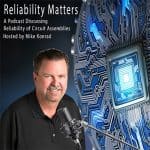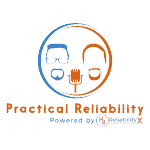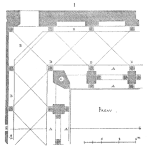
Data and Mechanisms
Abstract
Chris and Fred discuss how reliability data analysis really doesn’t mean a lot … unless you pair it with a failure mechanism. Why is this? What does that mean?
ᐅ Play Episode
Your Reliability Engineering Professional Development Site
by Christopher Jackson Leave a Comment

Chris and Fred discuss how reliability data analysis really doesn’t mean a lot … unless you pair it with a failure mechanism. Why is this? What does that mean?
ᐅ Play Episode
by Christopher Jackson Leave a Comment

Chris and Fred discuss what it means (as a reliability engineer) to try and change something … even though the organization that thinks they are open to change really isn’t. What can we do?
ᐅ Play Episode
by Dianna Deeney Leave a Comment

We can get stuck when trying to discover a solution to a problem.
We talk about a Nine Windows tool and TRIZ – more thought-provoking methods that we can use to get unstuck and move on to the next step.

Kirk and Fred discussing the dynamics of changing a design during the development process. The longer it takes to develop a new product the longer it allows the competitors to introduce new features and functions, which may have more market appeal than your products features right as your finishing development.
ᐅ Play Episode

Kirk and Fred discussing a basic question Fred asks in the Reliability Management Class and with new clients, that is “what are you trying to accomplish” with your reliability program,
ᐅ Play Episode
by Dianna Deeney Leave a Comment

We can get stuck when trying to discover a solution to a problem. Sometimes it helps to expand our thinking into other avenues. We can reframe our problem within its contradictions. What is it not?
We review an Is/Is-Not Matrix: how it’s built, its purpose, and how it can help us.
by Christopher Jackson Leave a Comment

Reliability is a measure of your product or system. Confidence is a measure of you. But we often forget this. We often subject our new product, system, or service to test after test until it reaches this thing called ‘required statistical confidence.’ But this is often an illusion, which is great! Because if statistical confidence is often not ‘real’ confidence, then we don’t always have to resort to statistics to get confidence. In fact, those of us who exclusively rely on statistics are usually those who lack confidence in the product, system or service and need a security blanket to make them feel OK. This webinar talks about confidence from the perspective of the ‘process owner.’ The design team lead. The CTO. The junior engineer. And how you can get a much healthier version of confidence through the way we design and produce our ‘things’ so that when it comes time to test … we are (justifiably) supremely confident that we will absolutely dominate whatever statistical testing hurdle can be thrown our way. And this sometimes means we don’t need to deal with statistics at all!
[Read more…]
by Mike Konrad Leave a Comment

This is the 100th episode of the Reliability Matters podcast! Hear clips from past episodes and messages from past guests on their views about reliability.
by Carl S. Carlson Leave a Comment

Carl and Fred discussing how much of what we do as reliability professionals falls into the role of consultants. Learning how to be better consultants will enhance the results of our day-to-day work.
ᐅ Play Episode
by George Williams Leave a Comment

Currently, a Director of Strategic Asset Management within their Professional Services Division at Brightly Software. Scott has 30+ years of enterprise strategic asset management experience in operational and general management, technology deployment and program management. Throughout his career, Scott has focused on the use of technology and process development to provide real value in multiple industry verticals. That focus means creating an objective, data-driven communication link between the technicians, engineers, facilities management teams, PDC teams, and the C-suite leadership where the capital investment decisions are made.
by Carl S. Carlson Leave a Comment

Carl and Fred discussing the process of knowledge transfer from one person to others. This process is at the core of influencing others to achieve reliability objectives.
ᐅ Play Episode

In this episode, I speak with Scott Henderson all about Condition Monitoring. He provides an great understanding of the different Condition Monitoring techniques, the P-F interval and the techniques which give us the maximum warning time. We talk about how important it is to consider not just the cost of performing the maintenance but to take into account the consequences of failure. The most important thing any Condition Monitoring Tech or engineer can do is to ensure that the recommendations are implemented and the assessment is closed out i.e. the root cause is identified which makes Scott and his team highly efficient and reliable.
You can learn more about Scott at https://thermalign.com.au/ and reach out to him via Email or LinkedIn.
by Dianna Deeney Leave a Comment


We’re uncovering risks during our new product development, about our design. How do we manage risks? What options do we have?
There are at least 5 options we can take to manage risks. We talk about each, and how quality and reliability methods and techniques may help us with the next steps to be able to make decisions with our team.
by Greg Hutchins Leave a Comment

Greg and Fred discuss the importance of management and leadership. They cover the similarities and differences between the two.
ᐅ Play Episode
by George Williams Leave a Comment

George Williams and Ramesh Gulati discuss Industry 4.0!